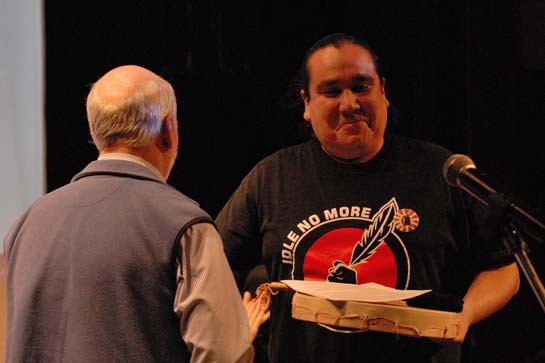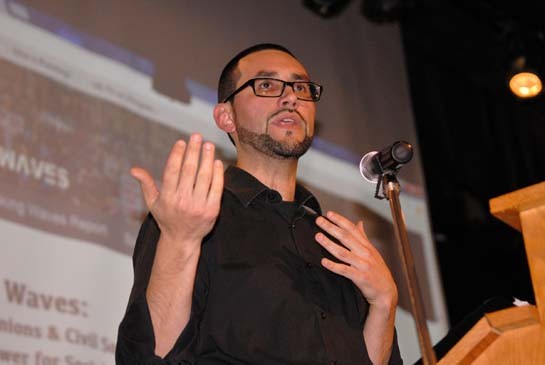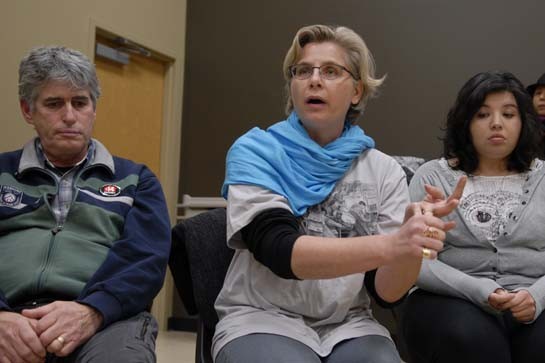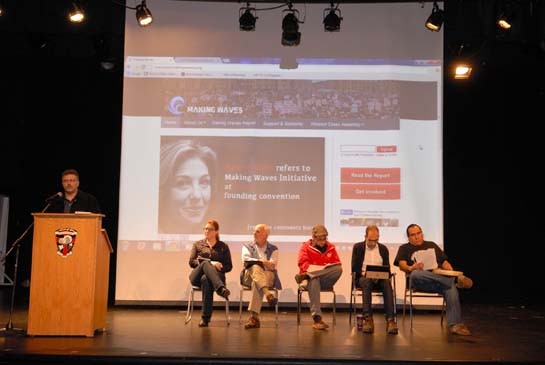
Clayton Thomas-muller, An Advocate For Environmental Justice And Indigenous Self-determination, Was Introduced By Activist And Polaris Institute Founder Tony Clarke At The Opening Session Of The Windsor-essex Making Waves Assembly.
"There is no such thing as society," Margaret Thatcher once declared, "just individuals and families." In November 2013, progressives in Windsor-Essex County, the southwestern corner of Ontario, came together with the support of UNIFOR to challenge these and other core ideas of neoliberalism. But they came also to question, and to move beyond, the silo-based activism and defeatist pessimism that often paralyze the existing Left.
They worked in the spirit of an earlier gathering sponsored by the then-Canadian Auto Workers Union that took place in 2012, at the union's Family Education Centre in Port Elgin, Ontario. At that first meeting, 82 activists — First Nations, students, environmentalists, trade unionists and others from all over Canada — met to talk about their frustrations, struggles and victories. Their ideas grew into the report "Making Waves: What Progressive Unions and Civil Society Must Do to Build Power for Social and System Change." It was that report that guided the folks in Windsor-Essex.
ORGANIZED PEOPLE BEATS ORGANIZED MONEY
Over a hundred folks gathered at Holy Names High School for the opening night of Windsor-Essex's Making Waves Assembly. First Nations, union members, environmentalists, students, anti-poverty activists and advocates for the unemployed all came to listen to a panel of speakers drawn from the ranks of Idle No More, the Quebec student movement and the Chicago Teachers Union.
Guided by the slogan "Organizing People Beats Organized Money," the speakers told us how they broke new ground by being ambitious, championing grassroots activism, and avoiding tokenism in working with others.
Idle No More, Clayton Thomas-Muller told us, wasn't only about four women who held a conference in Saskatoon to oppose the Harper Tories. It wasn't only about Attawapiskat Chief Theresa Spence, who waged her brave hunger strike in the face of widespread intolerance. It wasn't only about the inspiring spectacle of mass round dances and road blockades from coast to coast. Above all, Idle No More was about the awakening of coordinated activism at a grassroots level. First Nations women and young people found a passionate voice, one that captivated Indigenous and non-Indigenous society and compelled us to discuss Canada's shameful history. It reminded us that "we are all treaty people." It continues today to speak truth to power, and its database of over 256,000 supporters is still growing.
Jérémie Bédard-Wien described how the 2012 Quebec student strike also emerged from a history of grassroots organizing. Generations of student activists have protested against the rising costs of education but, in the past, government officials divided them by pitting "reasonable voices" against "unruly radicals." But this time, because the
Association pour une Solidarité Syndicale Étudiante (ASSÉ), the most progressive of Quebec's three student federations, supported a united front against the government, the students could not be divided.
ASSÉ — through a broader network called CLASSE — emphasized local democracy, ensuring decisions made at the top were supported by campus-based assemblies from below. Constant, painstaking appeals were made at the grassroots level, as face-to-face organizing — not Facebook — built packed assemblies of angry students. Those assemblies helped oust an unpopular government, and they pushed back neoliberal education reform for the first time in decades.
Matthew Luskin told us that in 2012, the Chicago Teachers Union (CTU) fought its own grassroots battle against neoliberal apologists. For decades, lobbyists for private charter schools had attacked the city, aided by politicians who willingly served their interests. Chicago, unlike anywhere else in the State of Illinois, had an unelected school board, and the mayor's appointees, typically a "who's who" of elite insiders, diverted funds intended for elementary and secondary schools into corporate projects. Schools were closed, and teachers laid off. Black and Latino areas were the hardest hit.
The CTU caucus that emerged listened to parents and helped them fight school closures. It called for an end to racist bias in school funding, and the corporate theft of public education dollars. Those activists of the Caucus of Rank and File Educators later became leaders of the CTU itself. They changed the union into an organization run by members, and willing to work with community leaders. When the city provoked a CTU strike, even mainstream newspapers reported wide support for the union

Matthew Luskin, Of The Chicago School Teachers Union, Spoke At The Opening Session Of The Making Waves Assembly.
Activists from Windsor-Essex County told their own stories about grassroots organizing. A trailblazer in union activism, and an important place for UNIFOR, this community is also home to First Nations activists, anti-poverty groups and unemployed worker advocates. In 2011, the Occupy movement found its voice here. And just days before our Making Waves Assembly, the community mobilized and forced government officials to save thoracic cancer surgery at the local hospital.
But years of fighting mighty foes and winning important gains hasn't stopped Windsor-Essex from following the same neoliberal path the rest of our society is on. Local politicians win office by promising to freeze taxes, as Windsor has done for the past six years. The Windsor Star features daily tirades against "union bosses" and other alleged irritants to growth and prosperity. Eddie Francis, Windsor's mayor, attacks the collective agreements of city workers, and loudly laments the perceived largesse of union contracts.
Windsor has Canada's highest unemployment rate (10.1 per cent), 40 per cent of residents live in low-income areas, while one in four children live in poverty. Politicians cynically appeal to less fortunate citizens by telling them austerity experienced by others will lead to prosperity for them. These conditions divide neighbours, and our adversaries exploit those divisions.
The political environment in Windsor-Essex and elsewhere must change, many folks at the Assembly insisted. Tinkering at the edges only ensures the dominance of neoliberal ideas; we must be more ambitious, and change the culture of progressive organizing. But we must do it together, in genuine solidarity.
GETTING TO KNOW "US"
Fifty of us returned, energized and inspired, the following morning. We split into two working groups (each with two assigned facilitators), and asked ourselves these questions:
* Which campaign struggles left an impression on you last night? Can organized people really beat organized money?
* Did you learn any lessons from what you heard last night?
* Does anyone have a story to share that relates to what we learned?
"Welcome to the 'Reservation' folks," said an indigenous activist. "Some of us have been living here for many years. The living conditions suck, and the future looks bleak. But one thing is certain: we're all in this together. It's time to fight back."
But can we fight back? The resounding consensus was 'yes,' but we must ask ourselves:
* Are we ready to move beyond fear in working together? Can we agree to disagree, argue, but still move forward on joint concerns?
* Will we build strong relationships between community activists?
* Do we face common threats and oppose common adversaries?
Everyone in the two groups agreed that the entrenched agenda of corporate power is something we either face together, or suffer through alone. Still, folks said adamantly, we must recognize our own privilege when we explore new ways of working together to fight that power, given that it doesn't impact everyone the same way. We must be mindful of how racism, sexism, colonialism, and homophobia/transphobia also divide us if we want to move beyond artificial solidarity.
"Work with us, but don't swallow us whole" added one participant, referring to unions and echoing others' fears about larger groups taking control of the process.
People spoke frankly about our Assembly being held in a Catholic high school, a charged and difficult venue for them, given their experience with organized religion. All of our featured movement organizers were male, a fact which contradicted our commitment to equality and inclusion. And because most of our facilitators, on the other hand, were women, some participants questioned how we recruit folks to organize and inspire us.
We then tackled three questions:
* Which major economic challenges do we face here in Windsor-Essex?
* What main environmental issues do we face in this region?
* What other social issues and struggles should we highlight?
Folks discussed the social conditions in Windsor-Essex: the impacts of unemployment, low-wage work, temp agencies, poverty, and limited public services (public transportation was often mentioned). They bemoaned the disturbing rates of cancer, asthma, and teen suicide, all of which are connected to the presence (and decline) of local manufacturing companies.

“mcguinty Is Just A Smilier Version Of Mike Harris,” Said Community Activist Mireille Coral (centre), During The Wrap-up Session Of The Making Waves Assembly, Held At Unifor Local 195’s Hall.
Our friends from nearby Aamjiwnaang First Nation (a community of nine hundred on the southern edge of Sarnia, Ontario) described the environmental conditions in their own community, dubbed North America's "Chemical Valley" by experts. Sixty-five petrochemical plants operate there, including major pipelines and refineries. Studies show alarming birth patterns, where girls are born at twice the rate of boys. Incidences of cancer, miscarriage, and respiratory illness in the area are obscene. Young people grow up accustomed to death. They keep clean funeral clothes in the closet at all times.
At the political level, participants noted that people in Windsor-Essex donate generously to charity but collaborate less on joint campaigns. When they do engage in political activism, generally they're reacting to immediate threats, such as an anti-union employer or a negative government policy. Why, people asked, can't we be proactive? Why can't we go on the offensive and target the corporate agenda in Windsor-Essex on our own terms? Let's take the fight to them and appeal to our neighbours for support.
Those concerns led us to our next set of questions:
* What kind of a progressive community do we have here in
Windsor-Essex?
* What strengths do we have as a progressive community?
* What weaknesses do we have?
This was a tense and tough moment in the room. We were forced to look at ourselves, and to look honestly at internal challenges we face in fighting for social justice. Windsor-Essex, everyone agreed emphatically, is a community where we work together and fight together. The labour movement has always been influential but so, too, have grassroots initiatives like Bloomfield House, Sisters in Spirit, the Windsor Workers' Action Centre, Canvas Campus, and anti-poverty campaigns. A long-standing commitment to social justice, and plenty of activists willing to fight for it, is our progressive community's primary strength.
But "coalition work" often means "back-patting sessions." We're nice to each other, but we're also less likely to challenge each other. As grateful as folks are to the local labour movement, it intensifies this dynamic. Non-union groups who disagree with local labour officials often find themselves shut out of collaborative efforts. That hurts us and divides us, and those divisions are then exploited by others. How can we chart a different course? How can we disagree but still work together? How can our diverse views make us stronger?
NAMING OUR ADVERSARIES AND OUR RESOURCES
Next, our two working groups focused on our local "power structure" by asking:
* What are the main elements of the power structure here in
Windsor-Essex?
* Who are the main corporate players? Which corporations? Which banks?
Others?
* What is the relationship between these corporate players and our
local/regional governments?
Business executives, mainstream media owners, developers, and politicians, predictably, made the list of the powerful. Chrysler and Ford are common names, but folks also mentioned Seagram, The Windsor Star, and the University of Windsor. And this city's power structure, unlike many Canadian municipalities, does include progressive groups, like UNIFOR Local 444 , UNIFOR Local 200, and some left-leaning faith communities.
But those progressive voices have little pull when it comes to the relationship between local/regional governments and our local elites. Our municipal government, with Eddie Francis as mayor, is captured by voices who speak to the conservative, selfish instincts of voters, and who tout tax freezes or cuts over serious investments in crucial city services like public transportation, affordable housing, and child care. And so, while Windsor-Essex retains a blue-collar, "working class" reputation, its municipal politicians are generally diehard conservatives.
With that grim reality check, we considered three related questions:
* What kinds of new alliances can we build in Windsor-Essex to take on the
challenges and power structure we face?
* How do we break out of our silos and build these new alliances?
* How do we go on the offensive and confront the corporate power
structure?
Folks cited efforts to reduce poverty as a case we could look to for some answers.
Until recently, Windsor-Essex had the reputation of being "Canada's most caring community," given its highest per capita donations to the United Way. Now, that number has been cut in half. Are people becoming more miserly here?
Our friends engaged in anti-poverty work tell a different story: not about a lack of generosity, but a lack of focused political action. When the automotive industry was booming, union workers happily made charitable contributions. Today, after the loss of so many good manufacturing jobs, people (including those still employed) have little to give.
But even that analysis, many participants said, doesn't grasp the bigger picture. Instead of focusing anti-poverty work on fundraising for charity, they asked, why can't we push for a municipal "living wage" as other cities have done, and leverage that strength to crack down on low-wage temp jobs? Why can't we work together to improve affordable housing, child care and school breakfast programs? Why can't we address the suffering of the Aamjiwnaang First Nation, or the closure of the Heinz tomato processing plant in Leamington?
"Donating" to change society is an individualist strategy that suits a neoliberal framework, and it suggests that we can stay in our activist silos, working separately on issues that are connected. Those silos may seem comfortable, and may have produced real gains in earlier times, but those days are over. Charity is important, but charity alone won't save us, solidarity will.
In anti-poverty work and everything else we do, many folks insisted, we must question the root of our problems. In the current neoliberal climate, we must mobilize around collective action, not give in to individual adaptation. We must see the bigger picture, and highlight the role of corporate power and how it stands in our way: If we convince our friends in Leamington that it's us against Warren Buffet, we're on the right track; if we build solidarity with Aamjiwnaang First Nation that forces positive action, we're on the right track; if we call for higher taxes on the wealthy in Windsor, while pushing for better public services that reduce poverty, we're on the right track.
.But which skills, we asked, do we actually need in order to challenge corporate power:
* How do we make sure our organizing and campaigning really do take on
the corporate power structure in Windsor-Essex?
* What kinds of new campaigning skills do we need to develop?
* What kinds of new organizing skills would be helpful?
People named skills in social media, desktop publishing, time management, communication and facilitation, anti-oppression training, and door to door canvassing. They felt that explaining academic concepts to non-academic audiences was an important skill. Many said the folks in Windsor-Essex who had these skills already could assist others who were seeking help. And Making Waves could play a crucial role.
Some felt that we should promote broader, more substantive values to challenge corporate power: "commitment," "courage," "focus," "confidence" and "inclusion." Others wanted to appeal to youth, dispute self-obsessed, "greed-driven" ideas, and inspire others to take collective responsibility.

Dino Chiodo, President Of Unifor Local 444, Spoke At The Opening Session Of The Making Waves Assembly. Other Speakers (left To Right): Tracey Ramsay, Tony Clarke, Matthew Luskin, Jérémie Bédard-wien And Clayton Thomas-muller.
Folks discussed the term "challenging scarcity" intensely, and its questioning of the idea that progressives must compete for dwindling resources. Our message, many insisted, shouldn't follow the mainstream, neoliberal line of Indigenous rights or Canadian rights; jobs or the environment; individual prosperity or higher taxes. We must instead create an inspiring common narrative that appeals to the best instincts of folks in our community. And we must develop a coordinated rapid response if any of us are attacked. That is how we will build trust, power and leverage against the corporate elite in Windsor-Essex.
Folks had worked hard and were tired, so together we decided to end our Assembly that evening by asking our friends from the Chicago Teachers Union to describe the infrastructure they used to catalyze their grassroots organizing.
HOW GRASSROOTS ORGANIZING HAPPENS
Leaders from our education community joined the Assembly that night, eager to learn from the CTU.
This is the story we heard: Many in the CTU worried they would never be able to rally members, given what had been happening in Chicago's elementary and secondary schools. They were also facing a tough adversary in Rahm Emanuel, the city's mayor. In one of his first acts of office, Emanuel sought to implement a longer school day (with no additional compensation). He appealed directly to school officials with promises of $150,000 in funding per institution, and free iPads. He ignored the union entirely.
The CTU immediately took the city to the labour board, and stopped the iPad/cash overtures. But after this, it did something different — something that testified to the union's creativity. It sent "listening committees" to neighbourhoods, asking parents for their thoughts on the longer school day. While parents did support a longer school day, the union heard, they didn't support teachers being forced to work longer for free.
The CTU used that idea to politicize union discussions. They reminded members that the community wasn't behind the mayor's agenda. They also challenged the corporate players who had accessed funds meant for public education and who had precipitated the underfunding of schools in Chicago's poor, black and Latino communities. They demonstrated in front of the Bank of America, they rallied at the doors of the Hyatt Hotel; they protested throughout the city. That approach inspired a new layer of activists in the union, and mobilized people in a way many never thought was possible.
When it came to the strike, the union's emphasis on grassroots activism gathered force beyond the leadership. In the heat of the moment, the membership demanded new tactics: a mass, silent march snaked through the mayor's tony neighbourhood; citizens occupied aldermen's offices; and members constantly mobilized on the city streets. So much grassroots capacity had been built, it soon acted of its own volition. The leadership needed to trust newly energized members and support their desire to take action.
As we debated how to apply these ideas in Windsor, we confronted the most intense controversy of the weekend: the fact that many union members, in particular, have accepted and even embraced neoliberal ideas. One person, a union member, talked about how he had encountered racism, sexism, and other prejudices from his co-workers, who felt they had more in common with the boss than the union.
His words evoked talk about union traditions and how they often come from a contradictory place: Because they are about winning economic gains, they can foster a what's-in-it-for-me mentality. But union values, for many, also reflect social values. Too many union members fall prey to the ideas of the Windsor Star and others precisely because they don't discuss their union's social commitments and its progressive history. Those values, some insisted, must guide the Making Waves process, to avoid the pitfall of adapting to a neoliberal, corporate consensus.
That point, while powerful for some was alarming for others. They worried that Making Waves would share the fate of other activist campaigns and be dominated by organized labour. We must constantly be aware of power imbalances in activist work, folks cautioned. Divisions are real. They ought not to be ignored, or swept aside. We must face them and grow from them.
We ended by creating three working groups for collective action: a "rapid response" working group; an Aamjiwnaang First Nation solidarity group, which spoke directly with people from that community about what they needed from Windsor-Essex; and a Leamington solidarity group, which committed to helping workers and their families fight the announced closure of the local Heinz tomato processing plant.
As Aboriginal activist Lilla Watson once said, "If you have come to help me, you are wasting your time; but if you are here because your liberation is bound up with mine, then let us work together."
So let us make waves, together.
Joel Harden is a writer, activist and educator living in Ottawa. He is also a member of Our Times' advisory board. Find out more about Making Waves and read the full report that inspired the folks in Windsor-Essex: "Making Waves: What Progressive Unions and Civil Society Must Do to Build Power for Social and System Change".










